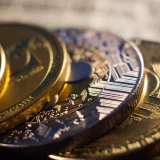- How Biometric Payment System Works?
- Example of Fingerprint Payment System
- Two-factor Authentication Process
- Additional Biometric Authentication Methods
- Advantages of Biometric Payment
- Increased Security
- Convenience and Ease of Use
- Potential for Higher Transaction Limits
- Emerging Trends in Biometric Payment
- Facial Recognition Technology
- Integration with Digital Wallets
- Adoption in Premium Customer Segments
- Case Studies and Success Stories
- Benefits of Biometric Payment Cards for Attracting New Premium Customers
- Increase in Customer Spending Through Contactless Biometric Payments
- Preferred Status of Biometric Payment Cards Among Users
- Future of Biometric Payment Cards
- Impact on Payment Transactions
- Convenience and Security Features
- Potential for Widespread Adoption in the Financial Industry
- Conclusion
Biometric Authentication in Contactless Payments: A Step Towards Secure Transactions

The biometric payment system is a payment method that uses the “Point of sale” technology to make payments. You must have heard that Amazon launched biometric payments in 2023. Many more vendors will start using it in due course.
The biometric payment system uses the “biometric authentication” technology. This technology helps me identify the payment sources that belong to me.
After that, the receiver can deduct the money from my account.
The most common biometric payment system in America uses the finger scanning method. However, I might have to enter a pin after the finger scan. Katie from TechTarget has listed some other modes of biometric payment, too.
Two other common biometric payment systems are iris and retina recognition. However, many vendors in the USA are also setting up voice and face recognition methods for payments.
How Biometric Payment System Works?

The biometric payment system works using a simple but effective method. However, its biggest benefit is two-factor authentication.
Example of Fingerprint Payment System
The store or shop must have a scanner or reader to take your fingerprint. After that, it will record your fingerprint. Most stores have a central database. Your banking information and fingerprint are saved there. Apple Pay also allows me to pay any merchant using my fingerprint.
After scanning the QR code, I must enter my fingerprint. After that, the money will be safely deducted from my bank account. After MasterCard launched its fingerprint payment method, many stores will now use it in the US.
Two-factor Authentication Process
The two-factor authentication methods ensure secure transactions. Firstly, I have to put my finger impression. Here, my fingerprint is checked. Secondly, I must input a pin. These two steps cannot be impersonated.
Additional Biometric Authentication Methods
I find that voice recognition is a good biometric payment system. Your favorite Walmart has already launched this feature in their stores. Go and check out fast.
In voice recognition, the system notes your voice frequency. As a result, nobody else can impersonate you.
Retina scan is also used in some stores to make payments. But I feel that Voice recognition is the future. We all use voice commands on our iPhones. Apple Pay lets us directly command “Siri” to pay from our accounts.
Advantages of Biometric Payment

Biometric payment is fast. It is simple. Certainly, more Americans are loving it, too.
Increased Security
The biggest advantage of biometric payments is the safety. No two people will have the same biometrics. Moreover, all biometric payments use two-factor authentication. So, it is more secure than other methods like tap and pay.
Convenience and Ease of Use
The millennials and GenZ of the USA have very little spare time. So, you want a fast and secure payment system. I feel that no other payment system is faster than biometrics. Above all, you only need a few minutes to register your fingerprint in the store database. After that, whenever you just enter your fingerprint, your payment is done in a jiffy!
Potential for Higher Transaction Limits
I surveyed the US market and found that biometrics will soon be used for high transactions. The Thales group already documents that 25% of the premium customers of banks are applying for biometric payment cards. Therefore, banks will certainly allow higher transaction limits for these customers.
Emerging Trends in Biometric Payment

Other than fingerprints, facial and voice recognition will become equally popular. Above all, we already use these authentication features on our iPhones.
Facial Recognition Technology
MasterCard has partnered with NEC Corporation to launch a secure face recognition technology for payments in the USA. Juniper Research meanwhile stated that 800 million devices will have facial recognition technology before 2024 ends.
It means they can pay through Apple Pay, MasterCard Payment Cards, and many more using this technology.
Integration with Digital Wallets
“Samsung Pay” and “Apply Pay” have linked biometric authentication. In other words, you can also use this inbuilt personalization feature to make payments from your phone’s wallet. For example, iPhone 15 allows you to use facial recognition or voice recognition to make payments.
Adoption in Premium Customer Segments
The biometric payment system is also enabled on your Samsung Pay wallet. As a result, you can easily use it to make premium purchases in a Samsung store.
Banks in the US are offering EMV biometric cards to premium customers.
The great part is that you don’t need to carry your card. Your EMV credit card can scan your finger, face, or voice. It will inspire premium customers to make more high-end purchases. According to a survey, 25% of customers are eager to get their hands on these cards.
Case Studies and Success Stories

Many banks and merchants are installing biometric payments. Notables are the Bank of Cyprus and J.P Morgan.
Benefits of Biometric Payment Cards for Attracting New Premium Customers
Bank of Cyprus has already launched contactless cards. Moreover, these cards have biometric sensors. The sensors can easily help you make big fund transfers with fingerprint scanning.
Mountain America Credit Union has also issued such cards for premium customers. As a result, people can now use fingerprint, voice, or face scanning to make a down payment for high-end purchases. J.P. Morgan allows biometric payment for selected clients. They can use a fingerprint or voice scan to pay any supply chain vendor.
Increase in Customer Spending Through Contactless Biometric Payments

Biometric payments are easy and fast. Therefore, more people will use it. In 2022, the net value of biometrics transactions was USD 10.2 billion. According to Statista, it will become USD 53 billion by the end of 2032.
Preferred Status of Biometric Payment Cards Among Users
Most customers in the USA prefer the fingerprint payment method. Apple Pay has already made voice recognition popular. However, I feel that most merchants and vendors only use the fingerprint payment method.
But, if you are using your Apple Pay wallet, it’s better to use voice recognition to make payments.
Future of Biometric Payment Cards

We will certainly expect a reduced failure rate and delay in biometric payments. Moreover, the Biometric Payment Cards will certainly enable higher transaction volumes in the future.
The future of biometric payment is filled with new opportunities. Firstly, we will see better algorithms. As a result, the error rate while detecting fingerprints will be reduced. Many banking companies and technology providers are working to provide flawless biometric payment cards to customers.
Secondly, more banks will issue fingerprint payment-enabled credit cards in the future. As a result, more people will use biometric payment systems in the future. Small-scale and premium customers will use it equally.
Impact on Payment Transactions
I think payment will be easier in the future. Above all, I will not have to carry any card. I will not have to remember my PIN also. Moreover, pay will be more secure.
Convenience and Security Features
I have reiterated biometric payment is the easiest. Also, it is the safest. However, its multi-factor authentication will make high-value transactions safer, too.
The entry of J.P. Morgan and “Mountain America Credit Union” into the biometric payments market is significant. This means that biometric payments will be more frequently used for big transactions in investment banking.
Potential for Widespread Adoption in the Financial Industry
Most financial institutions allow the use of biometric payment for ecommerce purchases. In the future, we will see partnerships between banks and retailers to make biometric payments possible.
Conclusion
Fingerprint payments will grow in the future as they are fast and secure. It makes payment simple for me. Today, a limited number of banks and mobile wallets offer biometric payment systems only. However, this will be the new norm very soon.
Most customers now prefer fingerprint scanning during checkout. However, in the future, voice scanning will also become popular. According to my research, these two will be the most popular among Americans during checkout.
The number of PoS transactions increased after the introduction of biometrics. We have already seen that speed and accessibility are the biggest benefits of this technology. As a result, the purchase volumes and amount of money exchanged during payments will also increase.
For More Finance Related Informative Article Click Below!!










